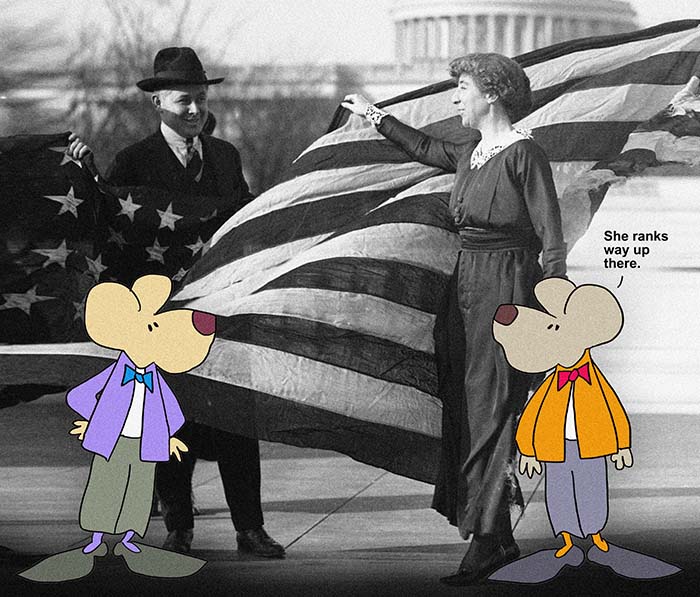As I thought about the likes of Jeannette Rankin, I wondered two things. What made a woman, born in the late 1880s, want to hold the political office only held by men? Something that never had been done before. And the second thought: Is there currently any job / position / endeavor that has not been accomplished by both men and women? (Excluding childbirth.)
First, I should revisit the story of Jeannette Rankin, who, on this very date, November 7, 1916, was elected to Congress as its first woman Representative.
Some thirty-six years earlier, Rankin was born on June 11, 1880, near Missoula in the Montana Territory. Things were pretty rough out there then, as Montana would not become a state for another nine years.
Her mother was a schoolteacher, Olive (née Pickering). Her father, John Rankin, was a Scottish-Canadian immigrant and a wealthy mill owner.
Here’s another thing I wonder. Jeannette Rankin was the eldest of six children, including five sisters (one of whom died in childhood) and a brother. It seems like a lot of “politicians” are firstborn. Yet, her little brother, Wellington, became Montana’s attorney general and later a Montana Supreme Court justice.
In addition, one of her sisters, Edna Rankin McKinnon, became the first Montana-born woman to pass the bar exam in Montana and was an early social activist for access to birth control. So, I think the family had built-in aspirations. Perhaps their parents instilled a sense of “you can do anything.”
But here is an interesting glimpse of her past. As an adolescent on her family ranch, Rankin had many responsibilities. These ranged from cleaning, sewing, farm chores, repairs, outdoor work, and helping care for her younger siblings. She also helped maintain the ranch machinery.
A hard worker. On one occasion, she single-handedly built a wooden sidewalk for a building owned by her father. In later writings, as she reflected on her childhood observations, she saw that women of the 1890s worked just as hard as men. On the western frontier, they would labor side by side as equals, the men and women. Girls and boys. Yet, women did not have an equal political voice—nor a legal right to vote.
All of this as she worked her way through school, graduating from high school in 1898. She studied at the University of Montana, graduating in 1902 with a Bachelor of Science degree in biology.
From there, she tried out a handful of different careers which included dressmaking, furniture design, and teaching. But, they weren’t the right fit.
When she was 27 years old, Rankin moved to San Francisco to take a job in social work. This was a brand new field back then. She immediately knew she had found her calling. From there, she enrolled in the New York School of Philanthropy in New York City.
She returned west to Seattle to attend the University of Washington and became involved in the women’s suffrage movement. From that point on, Rankin became one of the big organizers of the Woman Suffrage Party. I won’t list all of her accomplishments here, but she worked arduously for women’s rights.
As we know, Jeannette Pickering Rankin became the first woman to hold federal office in the United States. She was elected to the U.S. House of Representatives as a Republican from Montana. This, in 1916 and again in 1940. As of 2021, Rankin was still the only woman ever elected to Congress from Montana.
She devoted her life to women’s rights and more. She never married or had children. Rankin died on May 18, 1973, at age 92, in Carmel, California.
She truly, went where no woman had ever gone before.
And I wonder about the future of women in our country and the world. Will we ever, truly, be treated as equals?
=========
“I raise up my voice—not so that I can shout, but so that those without a voice can be heard. … We cannot all succeed when half of us are held back.”
— Malala Yousafzai
=========
“Feminism isn’t about making women stronger. Women are already strong, it’s about changing the way the world perceives that strength.”
— G.D. Anderson
========
“Women belong in all places where decisions are being made. … It shouldn’t be that women are the exception.”
Ruth Bader Ginsburg
==========
The woman, going boldly, where no one had gone before
